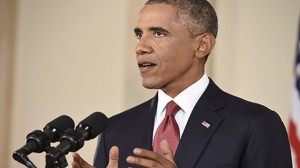 WASHINGTON (AP) — President Barack Obama is asking Congress for more than $1.8 billion in emergency funding to help fight the Zika virus. In an announcement Monday, the White House said the money would be used to expand mosquito control programs, speed development of a vaccine, develop diagnostic tests and improve support for low-income pregnant women.
WASHINGTON (AP) — President Barack Obama is asking Congress for more than $1.8 billion in emergency funding to help fight the Zika virus. In an announcement Monday, the White House said the money would be used to expand mosquito control programs, speed development of a vaccine, develop diagnostic tests and improve support for low-income pregnant women.
Zika virus disease is mainly spread by mosquitoes. Most people who catch it experience mild or no symptoms. But mounting evidence from Brazil suggests that infection in pregnant women is linked to abnormally small heads in their babies — a birth defect called microcephaly.
“What we now know is that there appears to be some significant risk for pregnant women and women who are thinking about having a baby,” Obama said in an interview aired Monday on “CBS This Morning.”
The White House said that as spring and summer approach, the U.S. must prepare to quickly address local transmission with the continental U.S. Obama added, however, that “there shouldn’t be a panic on this.”
Two health care experts will answer reporters’ questions Monday at the regular White House press briefing: Dr. Anthony Fauci, director of the National Institute of Allergy and Infectious Diseases, and Dr. Anne Schuchat, principal deputy director at the Centers for Disease Control and Prevention.
The administration’s request to Congress is separate from the budget for the next fiscal year that Obama will submit to Congress on Tuesday. The administration seeks the Zika money much more quickly than the regular budget process would allow.
On Tuesday, administration officials are slated to brief Senate Majority Leader Mitch McConnell, (R-Ky.) and other congressional leaders on the administration’s Zika prevention and response plan, McConnell’s office said. The lawmakers also expect to hear more about the new funding request and the administration’s other spending priorities “given limited federal resources,” according to a statement from McConnell spokesman Don Stewart.
The Pan American Health Organization reports 26 countries and territories in the Americas with local Zika transmission. To date, there has not been transmission of the Zika virus by mosquitoes within the U.S., but some Americans have returned to the U.S. with Zika infections from affected countries in South America, Central America, the Caribbean and the Pacific Islands.
Most of the money would be allocated to the Department of Health and Human Services to improve laboratory capacity, launch educational programs and establish rapid response teams. About $250 million of assistance would be directed specifically to Puerto Rico though extra Medicaid funding. The island is in the midst of a fiscal crisis. And $200 million would go toward research and commercialization of new vaccines and diagnostic tests.
The remainder, about $335 million would go to the U.S. Agency for International Development. The money would help affected countries in South America, Central America and the Caribbean provide training to health care workers, stimulate private sector research and help pregnant women gain access to repellant to protect against mosquitoes.
The Centers for Disease Control and Prevention reports 50 laboratory-confirmed cases among U.S. travelers from December 2015- February 5, 2016, the White House said. So far, the only recent case that has been transmitted within the U.S. is believed to have occurred in Texas through sex.
Zika usually is transmitted through bites from infected Aedes aegypti mosquitoes, which are common in Florida, along the Gulf Coast and states that border Mexico.
